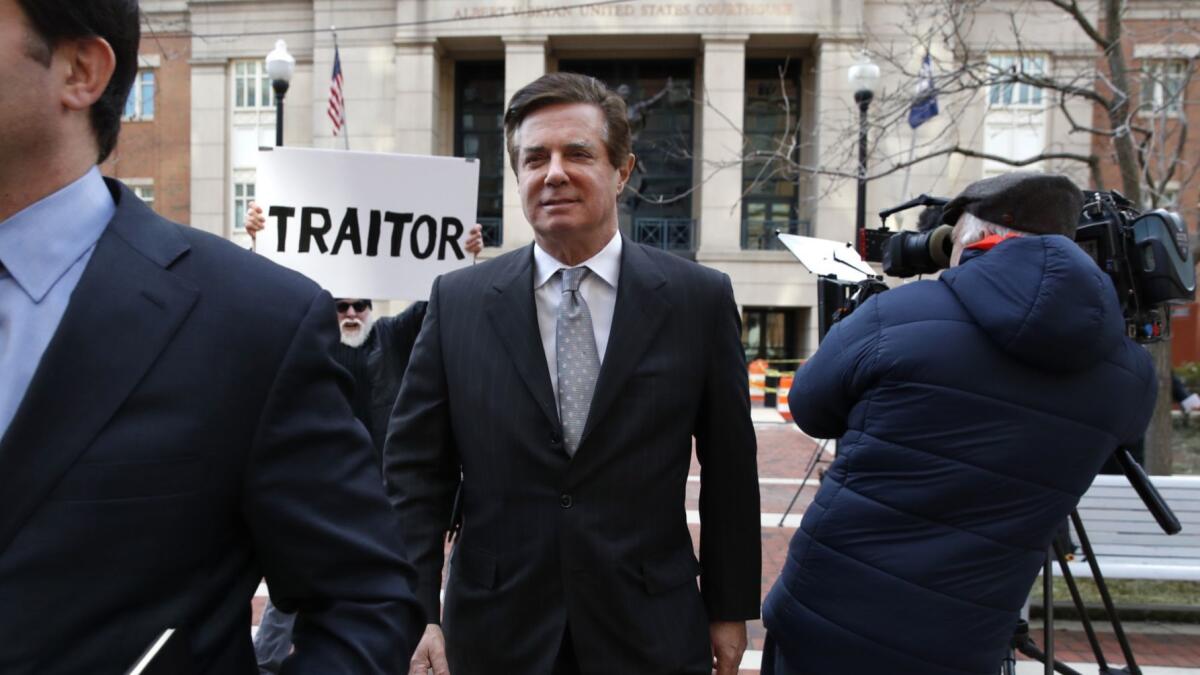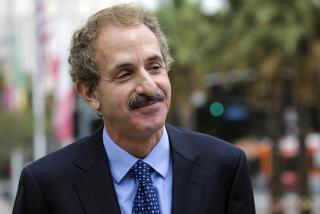Paul Manafort fights use of financial records at trial

- Share via
Reporting from Washington — Having lost his fight to have the bank- and tax-fraud case against him thrown out of federal court, Paul Manafort on Friday sought to have the financial records found in his condominium and storage unit tossed.
Those records were obtained through search warrants, partially released this week, that detail the extent to which the former lobbyist and Trump campaign chairman found himself in debt and dependent on money from pro-Russian interests.
His attorneys are asking U.S. District Judge T.S. Ellis, who ruled that special counsel Robert S. Mueller III’s case against Manafort can go to trial next month, to find that the searches were unconstitutional. An employee did not have authority to let agents into his storage unit, and they were given too much leeway to seize items at his condo, Manafort argued.
FBI Special Agent Jeff Pfeiffer testified Friday in an Alexandria, Va., federal court that he “may have learned” about the storage unit from a meeting FBI agents and Justice Department prosecutors held with reporters from the Associated Press in April 2017.
Ex-Trump campaign chairman Paul Manafort got $10 million loan from sanctioned Russian oligarch »
The meeting was set up so law enforcement could “receive information from reporters” on the AP’s investigation into Manafort’s finances, which the agent agreed was “substantial.”
One reporter “mentioned the storage unit,” Pfeiffer said, and the agent got a grand jury subpoena for records related to the unit the next day.
Manafort has pointed to that meeting as evidence that Andrew Weissmann, a member of Mueller’s team who at the time led the Justice Department’s criminal-fraud division, leaked information to the AP.
The AP published a report the day after the meeting revealing that Manafort received at least $1.2 million in payments listed in a secret ledger detailing spending by former Ukrainian President Viktor Yanukovych’s Party of Regions.
Through the subpoena, Pfeiffer learned the name of Alexander Trusko, a personal assistant to Manafort who ultimately let federal agents into the unit.
Paul Manafort seeks to block mention of ties to Trump at trial »
Trusko set up the unit, according to documents presented in court, and his name was on the lease. He told Pfeiffer that Manafort was an “authorized user” but had probably never actually visited.
Pfeiffer said that after consulting with the U.S. attorney’s office for the Eastern District of Virginia and the Justice Department’s criminal division, he got a search warrant “out of an abundance of caution,” although he believed that with Trusko’s signed agreement to let agents take “any items related to their investigation,” it was not necessary.
The records the FBI found, Pfeiffer said, include evidence that Manafort lied to obtain millions of dollars in loans and to obscure the money he was paid by Yanukovych’s party.
“Based on reporting from multiple sources, the FBI believes that Yanukovych’s government engages in systemic public corruption,” one search warrant affidavit reads.
On loan applications over a three-month period in 2016, Manafort variously represented his net worth as $15 million, $17 million, $21 million and $36 million, according to the court documents.
“He is so in debt,” an unidentified person wrote in an email regarding a $3.5-million loan to Manafort from a real estate company on Sept. 27, 2016, the documents state.
In February 2016, Manafort secured $9 million in loans from Genesis Capital, one he personally guaranteed and another backed by a property in Los Angeles. Genesis moved to foreclose on the Brooklyn house in September 2016 after both sets of loans went into default.
At one point that month, according to court documents, Manafort was being assessed over $2,000 a day in interest after missing two months of payments on one of the loans.
Manafort then secured a $16-million loan from an unnamed party, according to the court documents, in part to refinance the Genesis loans and save his townhouse from foreclosure.
Six years earlier, Manafort reported on his tax returns a $10-million loan that appeared to come from Oleg Deripaska, a Russian oligarch close to President Vladimir Putin, according to the filings.
The court documents also detail more of Manafort’s spending, including $49,000 to stay with his wife at a villa in Italy and $21,000 for a limited-edition titanium “Royal Way” watch from the luxury men’s store House of Bijan.
Prosecutors unsealed the redacted search warrants because they said they believed they would be exhibits at Friday’s hearing.
Redactions were necessary, Assistant U.S. Atty. Uzo Asonye wrote in a motion, because they contain information about the ongoing investigation and uncharged individuals that remains hidden to the public.
Manafort became Donald Trump’s campaign chairman in May 2016 and resigned in August amid reporting on his work for the pro-Russian political party in Ukraine. He now faces charges related to that work in Alexandria and Washington federal court, where a judge recently ordered him jailed until trial.
He did not appear in person Friday, having requested that he not be transferred from jail in Virginia’s Northern Neck.
Manafort has filed similar motions in the district and is awaiting a ruling from Judge Amy Berman Jackson.
More to Read
Get the L.A. Times Politics newsletter
Deeply reported insights into legislation, politics and policy from Sacramento, Washington and beyond. In your inbox twice per week.
You may occasionally receive promotional content from the Los Angeles Times.









